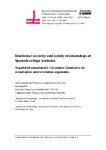Mostrar o rexistro simple do ítem
Emotional security and family relationships of Spanish college students
| dc.contributor.author | López-Larrosa, Silvia | |
| dc.contributor.author | Pardiño, Noelia | |
| dc.contributor.author | Ha, Anh | |
| dc.contributor.author | Cummings, E. Mark | |
| dc.date.accessioned | 2023-03-02T18:25:30Z | |
| dc.date.available | 2023-03-02T18:25:30Z | |
| dc.date.issued | 2022-12-04 | |
| dc.identifier.citation | López-Larrosa, S., Pardiño, N., Ha, A., Cummings, E. M. (2022). Emotional security and family relationships of Spanish college students. Revista de Estudios e Investigación en Psicología y Educación, 9 (2), 267-284. https://doi.org/10.17979/reipe.2022.9.2.9352 | es_ES |
| dc.identifier.issn | 2386-7418 | |
| dc.identifier.uri | http://hdl.handle.net/2183/32616 | |
| dc.description.abstract | [Abstract] This study is grounded on Systems Theory and Emotional Security Theory, and aims at extending past work by examining relations among children’s emotional security in the family system and the quality of family relationships among college students, a population scarcely addressed by the Emotional Security Theory. Participants were 236 female and male students attending a public Spanish University (meanage = 20.13 years old). We used the Security in the Family System Scale (SIFS), the Family Stress Scale, the Family Satisfaction Scale, the Bidirectional Parent-Adolescent Relationships Scale (BiPAR), and measures of destructive and constructive interparental conflict. The variables “living with family” and “parental divorce” were also studied. Results showed that parental divorce related to higher family stress, less interparental conflict resolution and worse bidirectional relationships with fathers. There were not significant differences in any of the variables under analyses between students who lived with their families while at college compared to those who did not live with their families. Emotional security in the family explained 52% of the variance of family satisfaction. This study has theoretical implications as it applies Emotional Security Theory to study young adults from divorced and intact families and who either live or not with their families while attending college. Our results agree and support this Theory. It also has practical implications for mental health and counselling services pointing to potential risk and protective family variables in college students. | es_ES |
| dc.description.abstract | [Resumen] Este trabajo tiene como base teórica la Teoría Sistémica y la Teoría de la Seguridad Emocional, y su objetivo es ampliar estudios previos al analizar las relaciones entre la seguridad emocional en el sistema familiar y la calidad de las relaciones familiares de los estudiantes universitarios, una población poco estudiada desde la Teoría de la Seguridad Emocional. Participaron 236 hombres y mujeres que estudiaban en una universidad pública española (mediaedad = 20.13 años). Se usó la Escala de Seguridad en el Sistema Familiar (SIFS), La Escala de Estrés Familiar, La Escala de Satisfacción Familiar y la Escala de Relaciones Bidireccionales Padres-Hijos (BiPAR), así como medidas de conflicto interparental constructivo y destructivo. También se consideraron las variables “vivir con la familia” y “divorcio de los padres”. Los resultados indicaron que el divorcio de los progenitores se relacionó con mayor estrés familiar, menos resolución constructiva de los conflictos y peores relaciones bidireccionales con los padres. No se hallaron diferencias significativas entre los estudiantes que vivían con sus familias y los que no. La seguridad emocional explicaba el 52% de la varianza de la satisfacción familiar. Este trabajo tiene implicaciones teóricas al aplicar la teoría de la Seguridad Emocional al estudio de jóvenes adultos de familias intactas y con padres divorciados, y que vivían o no con sus familias mientras estudiaban en la Universidad. Los resultados se ajustan y sustentan dicha Teoría. Igualmente tiene implicaciones prácticas para los servicios de apoyo al señalar variables familiares de riesgo y protectoras de los universitarios.. | es_ES |
| dc.language.iso | eng | es_ES |
| dc.publisher | Universidade da Coruña, Servizo de Publicacións | es_ES |
| dc.relation.uri | https://doi.org/10.17979/reipe.2022.9.2.9352 | es_ES |
| dc.rights | Atribución-CompartirIgual 4.0 Internacional (CC BY-SA 4.0) | es_ES |
| dc.rights.uri | https://creativecommons.org/licenses/by-sa/4.0/ | |
| dc.subject | Satisfacción familiar | es_ES |
| dc.subject | Conflicto interparental | es_ES |
| dc.subject | Divorcio | es_ES |
| dc.subject | Estrés familiar | es_ES |
| dc.subject | Jóvenes adultos | es_ES |
| dc.subject | Family satisfaction | es_ES |
| dc.subject | Interparental conflict | es_ES |
| dc.subject | Divorce | es_ES |
| dc.subject | Family stress | es_ES |
| dc.subject | Young adulthood | es_ES |
| dc.title | Emotional security and family relationships of Spanish college students | es_ES |
| dc.title.alternative | Seguridad emocional y relaciones familiares de estudiantes universitarios españoles | es_ES |
| dc.type | info:eu-repo/semantics/article | es_ES |
| dc.rights.access | info:eu-repo/semantics/openAccess | es_ES |
| dc.date.updated | 2023-03-02T15:54:15Z | |
| UDC.journalTitle | Revista de Estudios e Investigación en Psicología y Educación | es_ES |
| UDC.volume | Vol. 9 | es_ES |
| UDC.issue | Núm. 2 | es_ES |
| UDC.startPage | 267 | es_ES |
| UDC.endPage | 284 | es_ES |
| dc.identifier.doi | 10.17979/reipe.2022.9.2.9352 |






